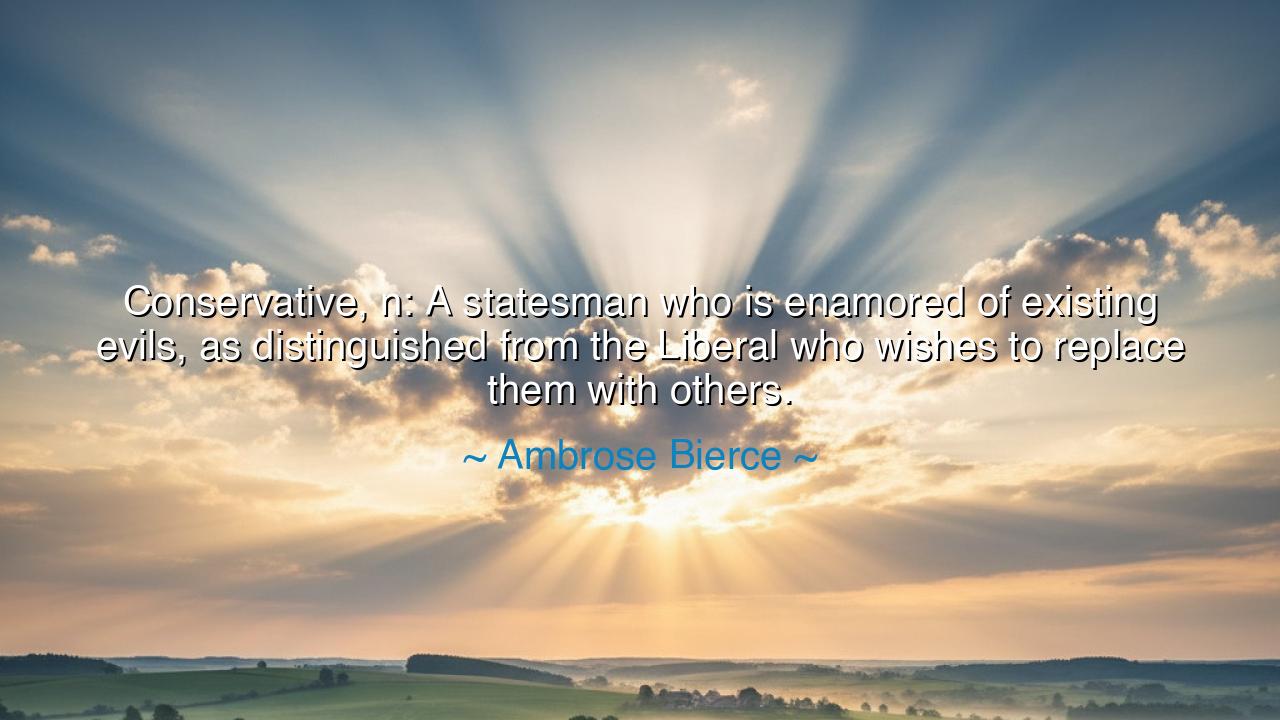
Conservative, n: A statesman who is enamored of existing evils
Conservative, n: A statesman who is enamored of existing evils, as distinguished from the Liberal who wishes to replace them with others.






Ambrose Bierce, master of cynicism and dark wisdom, once defined with a sharp blade of wit: “Conservative, n: A statesman who is enamored of existing evils, as distinguished from the Liberal who wishes to replace them with others.” In this sentence, drawn from The Devil’s Dictionary, he captures the endless cycle of politics, where men argue not over the absence of evil, but over which version of it shall endure. His irony unveils a grim truth: that neither faction holds perfection, for one clings to the flaws of the present, while the other risks forging new flaws for the future.
The origin of these words lies in the turbulence of the late 19th century, an America scarred by civil war, corruption, and the rise of industrial power. Bierce, who had fought in the Union army and seen death without illusion, distrusted the noble masks of political speech. He had watched conservatives defend the status quo, even when that status quo reeked of injustice. He had seen liberals push for change, but often replace one burden with another. His definition, though mocking, carries the bite of lived experience: both camps promise salvation, yet both carry ruin in their hands.
History itself offers confirmation. In Britain, conservatives once defended monarchy and aristocracy as eternal order, blind to the suffering of the common man. Liberals pressed for reforms—factory laws, suffrage, free trade—yet even these “solutions” birthed new hardships, as workers were cast into global competition and families into urban squalor. Neither side was wholly villain nor wholly savior. Bierce’s wit slices through the illusions to show that politics often shuffles the deck of evils, rather than banishing them.
So too in America after the Civil War. Conservatives sought to preserve the racial and social hierarchies of the Old South, clinging to the “existing evils” of segregation and disenfranchisement. Liberals pressed for Reconstruction, aiming to build a just society—but their efforts faltered, replaced with corruption and compromise that abandoned the very freedmen they sought to uplift. Bierce’s words echo here: change itself can betray, even as stasis destroys.
Therefore, O seekers of wisdom, do not be blinded by labels alone. See clearly that Conservative and Liberal are not gods of purity, but flawed men with competing visions. One may clutch the evils he knows; the other may trade them for new ones yet untested. The task of the wise is not blind allegiance, but vigilance—judging each policy by its fruit, not its banner. For the true enemy is not conservatism nor liberalism, but the evils that endure when men mistake names for justice.






KLe Thi Kieu Loan
Bierce’s remark has a provocative edge, as it suggests that both conservatism and liberalism come with their own set of flaws. But what about the idea that both conservatives and liberals might actually want the same end result—just through different paths? Could it be that both are necessary for a healthy political system, with conservatives ensuring stability and liberals pushing for necessary progress? How do we create dialogue between these two groups without falling into such a narrow view?
PHPham Huy
This quote by Bierce brings out an interesting idea about the nature of political ideologies. It seems to imply that conservatives are more focused on maintaining things as they are, while liberals are always seeking change, but possibly without considering the costs. How much does the 'need for change' within liberalism blind its proponents to the unintended consequences? Is there a danger in both ideologies wanting to replace one problem with another rather than finding more balanced solutions?
QTQuy Tam
Bierce’s quote paints a rather unflattering picture of both conservatives and liberals. It makes me wonder, though, if such a stark contrast between these two groups helps or hinders the political discourse. Are we too quick to assume that conservatives only want to preserve 'evils' while liberals are perpetually dissatisfied with the present? What would it take for people across the political spectrum to move beyond these oversimplified views and engage in meaningful solutions?
T135.Ngo Phuong Thao 12A13
I find Bierce’s comparison between conservatives and liberals interesting. It almost seems to suggest that conservatives are more attached to what exists, even when it’s flawed, while liberals are caught in a cycle of replacing one set of problems with another. Is this an oversimplification? Can we truly categorize these political ideologies so narrowly, or is there a middle ground where both conservatives and liberals can work together to address existing issues effectively?
TANguyen Tram Anh
Bierce’s quote offers a sharp and somewhat cynical take on conservatism and liberalism. It seems to imply that conservatives are stuck in the status quo, unwilling to change, while liberals are always seeking new ways to shake things up—often without a clear vision of the consequences. But does this mean that conservatism is inherently flawed, or is it simply that conservatives prefer stability, even if it comes with its imperfections?